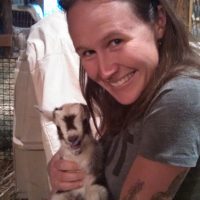A dear friend once said to me: “Forgiveness often begins with yourself.”
Forgiveness is a tricky thing.
As survivors of violence, we are often told that in order to heal, we must learn to forgive. That forgiving our abusers somehow releases us from their power and gives us the strength to move on.
In the same breath, we’re often told that we’re not letting them off the hook but that we are instead not allowing their actions to control us anymore.
I’ve read articles comparing encouraging forgiveness to victim-shaming, gaslighting, and more. And let me be clear: I don’t disagree with any of it. However, I do believe that forgiveness is an undeniable step in moving forward and letting go. But perhaps we don’t need to focus on forgiving those who have caused us harm, but ourselves instead.
From my experience, it’s not granting forgiveness to others that heals us—it’s granting forgiveness to ourselves that truly propels us forward.
Years before I really started to dive deep into my own healing, I was already so tired of my own anger, depression, insomnia, and distress. I was quite literally sick and tired. I was stuck in victim-mode, living in toxic cycles, and didn’t know how to move on.
With this forgiveness rhetoric in my head, I made the decision to forgive someone who had deeply hurt me many years before. I was going to truly forgive him. In my heart, I was going to be able to move on.
To my surprise, nothing really changed. I did the thing I was supposed to do, and everything was still the same. I still felt heavy. I was still deeply depressed. I still felt rage. I was still allowing others to cause me harm—I didn’t understand.
After a second violent breakup, I hit rock bottom and had no choice but to figure out how to heal. I had already chosen forgiveness, and it didn’t work. I felt frustrated and disheartened. What else was there?
I remember sitting with my journal, writing every tiny detail I could remember from that day so long ago. Replaying it over and over. I wrote, “If only I hadn’t gotten in his car that day…” and it hit me like a ton of bricks: in my 15-year-old mind, it was still my fault.
How on Earth do I go about forgiving myself?
I had made some poor decisions that day. I lied to my parents, skipped school, and I was somewhere I wasn’t supposed to be, with someone I wasn’t supposed to be with. I experienced the survival mode of freeze, which is something I was unaware of until years later when I was researching fight-or-flight modes and sexual assault.
My brain blocked out some of the details; I can’t remember if I said anything or not. I felt so much shame, so much guilt, so much anger. Why didn’t I scream? Fight back? Call the police? Run away when I had the chance? Report it? All of these questions had an overriding theme—they were all things that I did, or more importantly, didn’t do.
So many survivors experience guilt and shame surrounding their assaults, which is often what keeps us from reporting it. It doesn’t help that the media and the legal system push victim-blaming left and right: What were you wearing? What were you doing out by yourself? How much did you have to drink?
I believe this also is detrimental to our healing process. Suddenly we’re not just dealing with assault—we’re dealing with our own guilt and, often, isolation if we keep silent.
I struggled with this concept. We’re told it’s not our fault because it’s not—but at the same time, I feel like I put myself in a bad situation.
So, if it wasn’t my fault, what is the point in forgiving myself? He’s the one who did something wrong.
I tried viewing him as a concept instead of a human. I tried perceiving him as some sort of monster. I tried witnessing him as pure evil. I tried writing it off as he did everything wrong. None of that worked.
It didn’t work because it wasn’t true. I needed to take responsibility for my actions that day as well, and find a way to have compassion and forgiveness for myself for those decisions that I made.
It became clear to me that I needed to focus on my actions—and inactions—that day to be released from my own guilt. I needed to allow my younger self to grieve and heal without feeling this deep shame.
I left with him. I got in his car. I went into that house—but in the end, he made the decision to assault someone.
He is human—a human who made a really bad choice. But a human, nonetheless. And then I realized, if I need to learn how to forgive myself for my own poor decisions, then he needs to learn how to forgive himself for his poor decisions too.
He would have to learn to heal and forgive himself for what transpired that day.
That was not up to me. That was not my burden to bear. That is not up to us as survivors. And while I have also worked on forgiving him for his mistakes because that is part of my journey, I absolutely would not shove that idea down another person’s throat—as I can understand how pushing that concept might cause more harm than good. I believe it slowed down my process significantly.
The practice of forgiving others can be an important part of healing and our overall happiness, but forgiving ourselves is so much more powerful and necessary—and in my opinion, so much more important.
It would still take time for me to heal emotionally from the assault itself, but now I had the freedom to do so. I had granted myself compassion and space to process his actions, but this time, I was no longer getting caught up in my own guilt and shame. Only then did the weight truly begin to lift.
And, as my dear wise friend said to me, “It often begins with ourselves.”
~


 Share on bsky
Share on bsky





Read 4 comments and reply